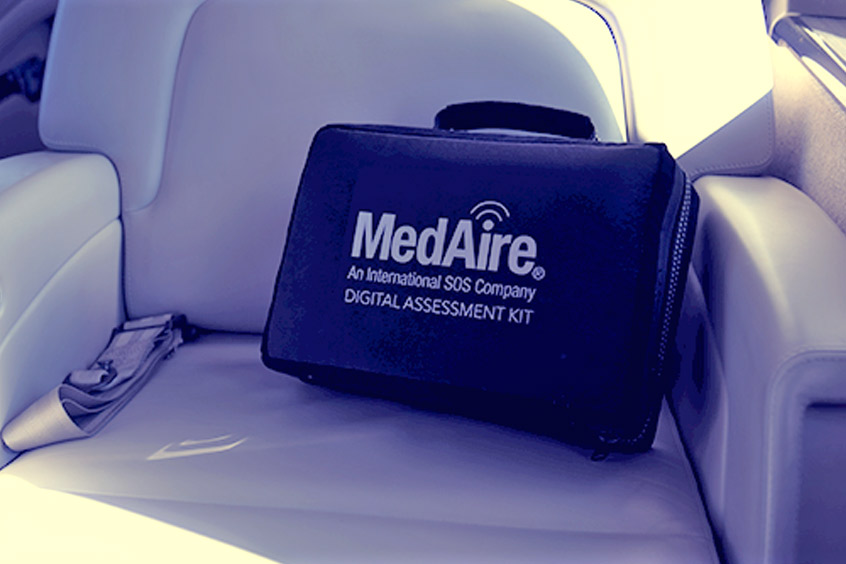


MedAire has made two new features available with the MedAire360 service that advances the health and safety profiles of crews and passengers: Airport Alert History; and My Routes.
The Airport Alert History leverages alerts back to 2015 to identify patterns, trends and potential risks at many airports to help crews make informed decisions and take proactive measures to minimise safety and security incidents from impacting people, assets and operations.
The airport data collection covers more than 2,000 airports around the world, providing a historical view of medical, safety and security alerts at airports in the system. Users can compare up to seven airports simultaneously. MedAire has leveraged nearly 10 years of alerts and more than 35 years of experience assisting the aviation industry with medical and security solutions to provide access to this exceptional data. Flight operations can research trends, identify patterns for new destinations or review locations already frequented, then execute missions with the highest level of safety and security, protecting assets and passengers every step of the way.
The My Routes feature of the MedAire360 portal is now available to all users. This new feature allows flight departments to input their flight plans and visualise alerts, incidents and associated threats along the planned flight route.
My Routes connects the MedAire and International SOS data catalogue, allowing users to plan for risks against emerging threats. By uploading flight plans, operators can quickly assess medical or security issues that may affect the planned mission. Alerts and other threat vectors will include disease outbreaks, criminal activity, geopolitical instability and natural disasters. This feature supports operational decision-making, reduces the risk of travel-related incidents and elevates the care they provide their passengers and crew.
In addition to visualising risks, the My Routes complements other features in the portal that provide access to comprehensive medical and security information, including current data on local medical facilities, emergency response services, security protocols and travel advisories.
“These two new features reflect our dedication and commitment to innovation to meet the evolving needs of the aviation industry,” says Bill Dolny, CEO of MedAire. “The Airport Alert History is something that no other assistance company can offer, and My Routes brings together MedAire and International SOS data to allow operators to quickly assess any emerging threats along their flight plan route. By providing access to valuable information that enhances our clients' safety and security profiles, we are redefining the aviation industry's standards for airport and travel risk assessments.”
John Cauthen, director of aviation and maritime security at MedAire commented, “We worked closely with our clients to develop the My Routes feature, and we are proud to offer a tool that truly meets their needs. Both new 360 features are invaluable tools for flight departments and airlines, helping them to proactively manage operational risks and ensure the security and safety of their assets, passengers and crew.”
In other news, MedAire's cutting-edge digital assessment kit is now available to customers throughout Europe for the first time. The components of the MedAire digital assessment kit have received CE approval, a rigorous certification that confirms compliance with European Union safety, health and environmental requirements. As a result, the digital assessment kit (DAK) is available for purchase throughout Europe, effective immediately.
“This achievement represents our commitment to delivering high-quality medical solutions that meet the highest regulatory standards,” states Paulo Alves, global medical director of aviation health. “There is a crucial link between better assessment and superior assistance, and MedAire is uniquely qualified to support our business and general aviation clients throughout Europe with this advanced digital technology.”
By incorporating this digital technology into the assessment process, the kit enhances the ability of medical professionals to evaluate and treat patients in flight remotely, improving the quality of care and outcome for passengers and crew.
How DAK makes data collection easy:
- Blood pressure monitor: utilising a digital blood pressure cuff in an aircraft setting provides a distinct advantage over its analogue counterpart by not requiring a stethoscope, which is always deeply affected by the micro-vibration and high ambient noise levels on board. Crew members can digitally collect precise readings using electronic sensors, eliminating the need to listen to the patient's pulse. As a result, crew members can obtain reliable and accurate blood pressure readings quickly.
- 12-lead ECG recorder is a user-friendly upgrade from the standard 1-lead ECG offered by most devices of similar size, with an easy-to-apply torso-sized sticker. MedLink doctors can now access vital information to assess a patient's heart condition in the same way they do in the emergency room environment.
- Digital glucometer is a compact, lightweight device ideal for use in various settings, including travel and in-flight situations, because it doesn't need calibration to provide accurate results. In addition, digital glucometers require smaller blood samples than alternative methods, making the testing process less invasive and more comfortable for the individual.
- Pulse oximeter is a non-invasive device that provides instant, reliable results by simply clipping onto a person's fingertip. This ease of use is precious in time-sensitive emergencies where rapid assessment is crucial. In addition to oxygen saturation, they can detect blood perfusion and respiratory rate without a nasal cannula.
- A contactless thermometer or an infrared thermometer minimises risk by taking immediate temperature readings without direct physical contact with the patient, reducing the potential for spreading germs. The digital assessment kit represents a significant step in giving access to the best quality in-flight medical evaluation.
With the ability to assess patients quickly and accurately, MedLink doctors can make informed decisions about passenger care, whether that involves administering treatment in flight or arranging for diversion to a medical facility for emergency care. Using the DAK, crews can confidently diagnose and treat patients, knowing expert medical care is always within reach.
